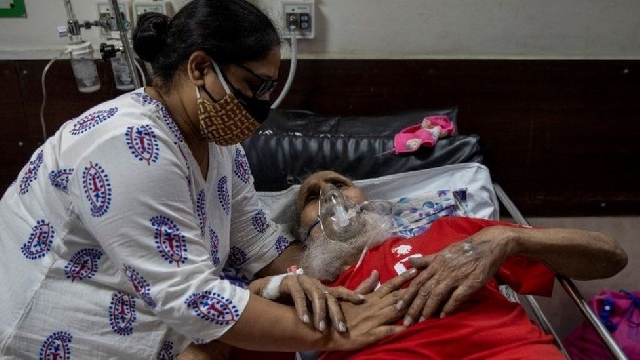India Covid pandemic: Delhi calls for army help amid crisis
 Delhi hospitals are struggling to cope with huge numbers of Covid patients
Delhi hospitals are struggling to cope with huge numbers of Covid patients
The authorities in the Indian capital Delhi have called for help from the army as the city grapples with a brutal second wave of Covid-19 cases.
Hospitals in the city are in crisis, with intensive care beds full and an acute shortage of medical oxygen.
Delhi's government wants the army to run Covid care facilities and intensive care units.
Across India, case numbers since the start of the outbreak are closing in on 20 million.
The country has seen more than 300,000 new cases a day for nearly two weeks straight while deaths stand at 220,000.
Experts say total Covid cases and deaths in India are likely to be much higher, citing lack of testing and patients dying at home without being seen by doctors.
Hospitals 'overwhelmed'Delhi, which this weekend reported record daily deaths at more than 400, wants the army to run medical care with oxygen facilities for around 10,000 patients, and a further 1,000 intensive care units.
Deputy Chief Minister Manish Sisodia said that with healthcare "overwhelmed... it will be a timely help to the people of Delhi if the Ministry of Defence, with the considerable resources at its command, is tasked with the responsibility to provide and man the additional Covid health facilities".
He also asked for "urgent" help transporting much-needed oxygen.
India has already ordered its army to send its oxygen from army reserves to hospital while retired military medical personnel have been called up to help.
Delhi Chief Minister Arvind Kejriwal has repeatedly said that the city is not getting enough oxygen from the federal government, which allocates oxygen quotas to states.
But federal officials deny there are shortages, saying the challenge has come from transportation.
India produces thousands of tonnes of oxygen a day, but some experts say the supply crunch comes from a lack of investment in distribution networks.
Delhi hospitals have resorted to sending SOS messages on social media to secure supplies. For residents, hours spent in queues to top up portable canisters have become part of daily life.
"It's a battle we are fighting every day," said Dr Gautam Singh, who runs the Shri Ram Singh hospital.
"Half of my hospital staff are on the road with cylinders to get them filled every day, going from one place to another."
There are severe strains outside of the capital too. In the southern state of Karnataka, 24 people died in one hospital, but the government there has denied reports that all of them died due to a shortage of oxygen.
Vaccine drive stallsIndia's Covid crisis has been compounded by a sluggish vaccination campaign.
Despite being the world's biggest producer of vaccines, there is a shortage of supplies. Since January, just over 10% of India's 1.4 billion people have had one dose and only about 2% two doses.
The chief executive of India's Serum Institute, the world's biggest vaccine manufacturer, has warned shortages will last for months.
Adar Poonawalla told the Financial Times the institute had been unfairly maligned over the lack of supplies.
He had not boosted capacity earlier, he said, because "there were no orders, we did not think we needed to make more than 1bn doses a year".
Source: BBC
Trending World

Five arrested over plot to attack German Christmas market
14:05
Dozens killed in Morocco flash floods
15:29
Ugandan army admits holding priest who'd been missing for days
15:27
US designates Colombian cocaine gang a terrorist group
22:08
EU waters down plans to end new petrol and diesel car sales by 2035
22:05
Rebels say they will withdraw from key DR Congo city at US request
21:59
Trump files $5bn defamation lawsuit against BBC over Panorama speech edit
12:26
FBI foils New Year's Eve terror plot across southern California, officials say
11:38
'Bandits' kidnap worshippers during church service in Nigeria
10:42
US accused of using illegal workers at centre processing refugee claims in South Africa
11:59



